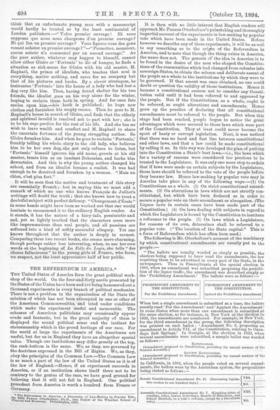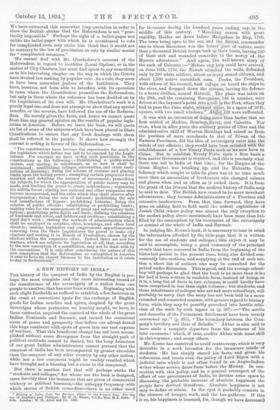THE REFERENDUM IN AMERICA.*
THE United States of America form the great political work- shop of the world. On the four-and-forty anvils presented by the States of the Union have been and are being hammered out a thousand experiments in every branch of political mechanics. There is not a problem in the organisation of the State the solution of which has not been attempted in one or other of the American Commonwealths, and tried under conditions which make the experiment useful and memorable. The schemes of American politicians may occasionally appear crude and fantastic, but in the great majority of them is displayed the sound political sense and the instinct for statesmanship which is the proud heritage of our race. For the world at large the experiments of the Americans are useful, but for us in England they have an altogether special value. Though our institutions may differ greatly at the top, the rock-bottom is the same. We, as they, are governed by the doctrines expressed in the Bill of Rights. We, as they, obey the principles of the Common Law.—The Common Law is as much a part of the law of the United States as it is of the law of England.—Hence, if an experiment succeeds in America, or if an institution shows itself there not to be contrary to the genius of the race, we have good ground for believing that it will not fail in England. One political !precedent from America is worth a hundred from France or Germany.
• The Referendivn in America : a Discussion of Law-Makine by Popular Vote. By Ellis Paxson Oberholtaer, Ph.D., late Follow of the Wharton School of Finance and Economy. Philadelphia, 1803.
It is then with no little interest that English readers will approach Mr. Paxson Oberholtzer's painstaking and thoroughly impartial account of the experiments in law-making by popular vote which have been made in the United States. Before however we describe any of these experiments, it will be as well to say something as to the origin of the Referendum in America, and to note that though the thing exists in America, the name does not. The genesis of the idea in America is to be found in the desire of the men who shaped the Constitu- tions of the communities which had changed from colonies into sovereign States, to obtain the solemn and deliberate assent of the people as a whole to the institutions by which they were to be governed. If that assent was once obtained, no one could doubt or question the validity of those institutions. Hence it became a constitutional custom not to consider any Consti- tution valid until it had been referred to and approved by the people. But if the Constitutions, as a whole, ought to be referred, so ought alterations and amendments. Hence grew up the practice of declaring that all constitutional amendments must be referred to the people. But when this stage had been reached, people began to notice the great advantages which were secured to those laws which were part of the Constitution. They at least could never become the sport of hasty or corrupt legislation. Next, it was noticed that there was no bard and fast line between constitutional and other laws, and that a law could be made constitutional by calling it so. In this way was developed the plan of putting into the Constitution a State's best laws,—i.e., the laws which
for a variety of reasons were considered too precious to be trusted to the Legislature. It was only one more step to ordain that if laWs were made on certain subjects by the Legislature, those laws should be referred to the vote of the people before they became law. Hence law-making by popular vote may in America take place in any of the following ways :—(1) On Constitutions as a whole. (2) On strict constitutional amend- ments. (3) On alterations in laws which are not strictly con- stitutional, but which have been declared so in order to
secure a popular vote on their amendment or abrogation. (The Liquor laws in certain cases have been made part of the
Constitution.) (4) On laws dealing with subjects in regard to which the Legislature is bound by the Constitution to institute a reference to the people. (5) On laws which a Legislature, for reasons of its own, determines shall be referred to a
popular vote. (" The location of the State capital." This is a form of Referendum which has often been used.)
The following is Mr. Oberholtzer's account of the machinery by which constitutional amendments are usually put to the people:—
"The ballots are usually worded as simply as possible, the electors being supposed to have read the amendments, the law requiring them to be advertised in every part of the State, in the newspapers. Thus in Pennsylvania at the special election in 1889, when an amendment was submitted proposing the prohibi- tion of the liquor traffic, the amendment was described simply as the Prohibitory Amendment.' The ballots were as follows :—
When but a single amendment is submitted at a time, the ballots usually read' For the Amendment' and Against the Amendment.' In some States when more than one amendment is submitted at the same election, as for instance, in New York at the election in 1892, the amendments are numbered. For example, in New York, for the third amendment in the group, the following description was printed on each ballot : Amendment No. 3, proposing an amendment to Article VII. of the Constitution, relating to Onon- daga Salt Springs.' In Georgia, at the election in 1892, when several amendments were submitted, a sample ballot was worded as follows :— RATIFICATION.
(Amendment proposed to Constitution, providing for annual sessions of the Genera Assembly.) AGAINST RATIFICATION.
(Amendment proposed to Ooustitntion, providing for annual sessions of the
General Atisoinbly,)
In California, in 1892, when the people voted on several amend- ments, the ballots were by the Australian system, the propositions being stated as follows :—
Senate Constitutional Amendment No. 10. tire Session to one hundred days.) (Increasing logisla-trEs•
PROHIBITORY AMENDMENT TO THE CONSTITUTION.
For the Prohibitory Amendment. PROHIBITORY AMENDMENT TO THE CONSTITUTION.
Against the Prohibitory Amendment.
Assembly Constitutional Amendment No 7. (Limiting debts of counties, cities, towns, townships, Boards of Education, and School Districts, to a year's revenue, except by a two-thirds vote.) NO. YES.
NO.
We have extracted this somewhat long quotation in order to show the British elector that the Referendum is not " prac- tically impossible." Perhaps the sight of a ballot-paper not unlike the ballot-paper with which he is accustomed to vote for complicated men, may make him think that it would not be contrary to the law of gravitation to vote by similar means for " complicated measures."
We cannot deal with Mr. Oberholtzer's account of the Referendum in regard to localities (Local Option), or in the matter of City Charters, but must find space to say something as to his interesting chapter on the way in which the Courts have treated law making by popular vote. As a rule, they seem to have been somewhat jealous of the Institution. They have, however, not been able to interfere with its operation in cases where the Constitution prescribes the Referendum, but only in those where the reference has been decided on by the Legislature of its own will. Mr. Oberholtzer's work is a purely legal one, and does not attempt to show that any special benefits, or the reverse, have followed the use of the Referen- dum. He merely gives the facts, and hence we cannot quote from him any general opinion on the results of popular legis- lation in America. Before we leave his book, we will quote his list of some of the subjects which have been placed in State Constitutions to secure that any fresh dealings with them shall be referred to the people. It shows how strongly the current is setting in favour of the Referendum :—
" The constitutions have become the repositories for much of the legislation which before was left to be enacted by the Legis- latures. For example we have to-day such provisions in the constitutions as the following :—Establishing a public-school system, and stating, in minuteness, as to how it shall be maintained ; establishing colleges, universities, and other insti- tutions of learning ; fixing the scheme of revenue and placing limits upon the taxing power ; exempting certain properties from taxation and detailing the manner of assessment ; prescribing the subjects for which the appropriation of public money may be made, and limiting the power to create indebtedness ; organising the militia forces ; stating how railroad and other companies may become incorporated, and the rules which they shall observe after incorporation ; fixing the rate of interest ; prohibiting the sale and manufacture of liquors ; prohibiting lotteries ; fixing the salaries of public officials ; establishing or prohibiting banks ; making rules for the management of penal and reformatory insti- tutions; prohibiting prize-fights and duels; defining the relations of husbands and wives, and debtors and creditors; establishing a legal day's work ; stating the methods of administration which shall be employed in counties, cities, townships, and other local districts ; making legislative and congressional apportionments; removing from the State Legislatures the power to make city charters and vesting it in Boards of Freeholders, chosen by the electors within the respective cities. Indeed, there are now few matters, which are subjects for legislation at all, that, according to the new conception of a constitution, may not be deait with by the conventions. It is only after considering the nature of this new conception that the Referendum as exemplified in America is seen to have its closest likeness to the institution as it exists to-day in Switzerland."



















































 Previous page
Previous page